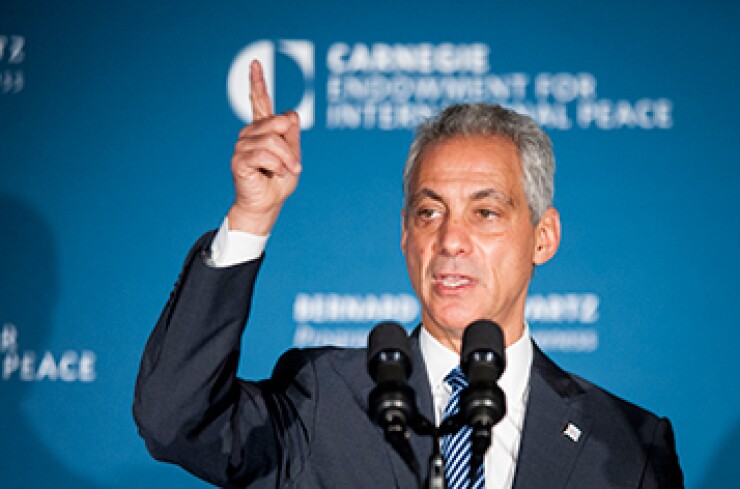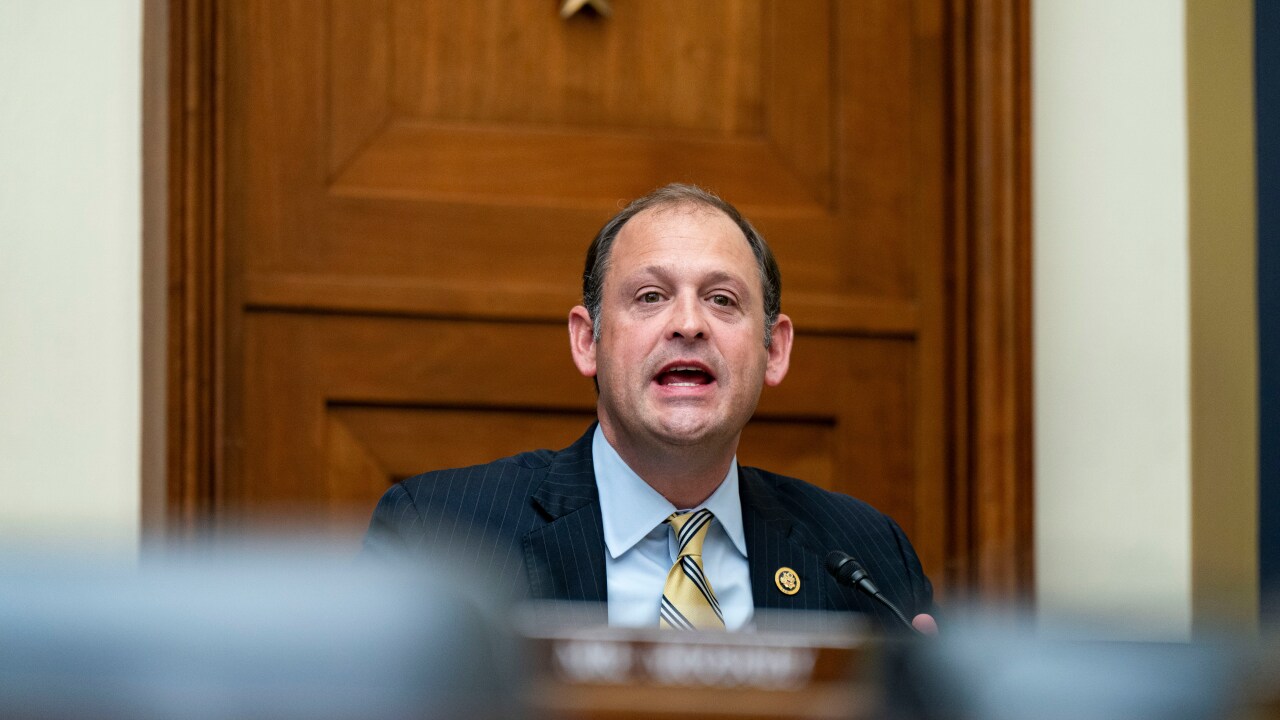
CHICAGO – Chicago's plan to rescue its largest pension fund with the help of a new water and sewer tax cleared a key vote Thursday despite complaints about the tax's impact and concerns it doesn't fully solve the fund's crisis.
The 26-6 vote by the Finance Committee advances the measure to phase in over four years a 29.5% hike in water and sewer rates by taxing usage to the full council, which meets on Wednesday.
The plan Mayor Rahm Emanuel released last month establishes a funding schedule for its municipal employees' fund to put the city on track to reach an actuarially required contribution in 2022. The city will then need to come up with more than $250 million in additional revenue to maintain the ARC payment and keep the fund on a track to solvency.
Emanuel's chief financial officer, Carole Brown, and budget director Alex Holt defended the proposed tax and funding scheme as the best balance of the needs of the fund with the burden on taxpayers.
"We acknowledge there will need to be additional revenue for this fund" and the city's other pension funds down the road, Brown said.
The pair took pointed questions during the hearing. A handful of council members expressed dismay that lower income property owners who use laundromats will be burdened if owners pass the water tax hike onto patrons.
Other aldermen questioned why the city wasn't phasing in the tax more quickly to sooner reach an ARC level.
"We're here because we didn't do this five years ago," council member John Arena said, referring to when Emanuel first took office.
New numbers on the funding scheme came from an
The plan calls for the city to pour $2 billion more over the next six years than the current $1 billion it owes under the existing statutorily based funding formula in which city contributions are based on a percentage of what employees contribute.
But after 2022, the city's proposed funding scheme will fall more than $250 million short of what's needed to meet payment requirements.
"As we all know, the multiplier funding set out in existing law is insufficient, and if nothing is done the municipal fund is projected to reach insolvency in the next 10 years," the letter to council members says. "The city's proposal to move the municipal fund to actuarial based funding will finally address decades of underfunding and put the fund on a path to solvency."
The vote came with some council members feeling bruised after approving other tax increases, most notably a record $543 million annual property tax hike to stabilize the city's police and firefighter funds last year. Most agree with Emanuel that the city can't again turn to the property tax levy, which must also support increases for the financially troubled Chicago Public Schools. Emanuel has typically enjoyed majority support among the 50 aldermen but has seen more pushback of late.
Under the funding plan, Chicago would budget in 2017 for a $267 million contribution to be made in 2018. It ramps up to $344 million in budget year 2018, $422 million in 2019, $499 million in 2020, and $577 million in 2021. The next year it makes the leap to what the city said will be an ARC level of $879 million.
The new, phased-in water/sewer tax accounts for $56 million in the first year and grows to peak of $241 million in 2020 and remains there. The share covered by enterprise funds – namely the water and aviation department, where employees participate in the fund – would rise from $43 million at the start of the ramp to $141 million at the ARC level. The share of the contribution coming from property tax revenue would hold steady at $124 million through the five-year ramp and first year of the ARC payment, as would the $110 million from the city's general fund
During the five-year ramp period, a portion of revenues would be set aside in an "escrow" that by 2022 would reach nearly $260 million. Those revenues will go to help cover the jump to an ARC payment of $879 million from $577 million in the final ramp year.
The following year the payment would rise only slightly to $898 million, but the city won't have the benefit of the "escrow," raising questions over how it would cover the more than $250 million gap in tax, general fund, and enterprise fund revenues.
The ARC payments continue to grow, but at a slow pace, hitting the $1 billion mark in budget year 2029. That's four years after the city would end up paying $1 billion on a pay-as-you-go basis when assets are exhausted under the existing funding scheme.
Payments reach nearly $2 billion at the end of the 2057 schedule, according to the actuarial analysis from Aon Hewitt. The plan's funded ratio would remain below 50% until 2050 when it is to begin building to reach 90% in 2057.
City finance leaders acknowledged the city needs to identify a new revenue source, spending cuts or benefit changes to meet ongoing ARC payments for not the just the municipal fund but the city's other three pension funds that rely on a similar ramp to ARC funding. Officials said there's room to further increase the water/sewer tax down the line and funding demands could ease should funded ratios improve with strong investment returns.
Market participants have been clamoring for a solution to the municipal fund's woes and though some say the plan takes too long to stabilize the fund and could too easily fall off track, they have praised the water/sewer tax choice.
"Since the water customers haven't been paying the full appropriate allocated accrued expense of the pensions for the water department employees for years, the tax on ratepayers actually makes equitable economic sense -- a bit late but appropriate nonetheless," said Richard Ciccarone, president of Merritt Research Services, after reviewing the new documents.
Because the current funding schedule and benefits are built into state statutes, the city still needs state legislative approval, which it will seek in the fall.
The city's contribution would remain set in statute, rather than requiring one based on actuarial requirements, but the payment plan would be designed to amortize the unfunded liabilities. Under the plan, new employees will also pay more into the fund and employees in what's known as tier 2 who were hired in 2011 and after will be asked if they want an earlier retirement age in exchange for making higher contributions.
Lawmakers have previously approved Emanuel's funding scheme changes for the police and firefighter pension funds. Gov. Bruce Rauner vetoed the changes, but lawmakers overrode the veto.
The schedule leaves in place an assumed 7.5% rate of return, a level that some believe is too optimistic. Assumed investment returns have come under scrutiny nationally as a contributing factor to pension funding woes.
"That will be a challenge to maintain that assumption," Ciccarone said.
Under the city's proposal, current employees and retirees wouldn't see any change. The city previously had pursued reforms that cut benefits for laborers' and municipal fund employees but the Illinois Supreme Court earlier this year concluded they violated state constitutional protections.
The utility tax doesn't run afoul of covenants tied to the city's water and wastewater bonds because it doesn't directly impact water and sewer rates that secure more than $4 billion of bonds.
The municipal fund, which has about 70,000 members, has $9.8 billion of unfunded liabilities and $18.6 billion of net pension liabilities under new accounting rules. The city's total net pension liabilities are $33.8 billion.
The city's pension tab has dragged its ratings down, leaving it with one junk rating. The city's general obligation bonds are rated Ba1 by Moody's Investors Service and BBB-plus by Kroll Bond Rating Agency and S&P Global Ratings. Fitch Ratings has the city at the lowest investment grade level of BBB-minus.
In its first positive credit news in some time, Fitch Ratings last week revised its outlook on the city's rating to stable from negative recognizing "the recently enacted material increase in funding to the city's pensions."





